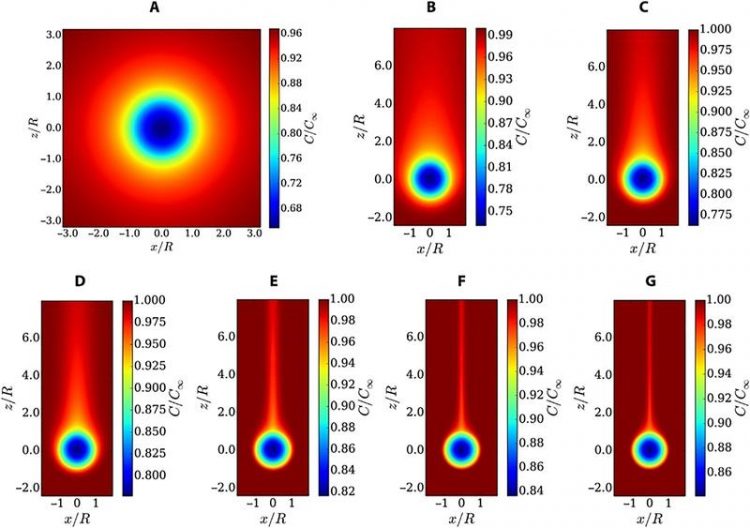New findings help to better calculate the oceans’ contribution to climate regulation

When the porous aggregates sink faster towards the seabed, the generated faster fluid flow can provide more oxygen to the aggregate. Illustration: Science Advances
Oceans contain about 50 times more carbon than the atmosphere, and about 20 times more carbon than land. Algae and organic particles in the upper, sunlit water layer bind the CO2, sink to the seabed and deposit there.
These so-called aggregates are the main actors in the transport of organic carbon from the surface into the deep sea. By absorbing CO2 from the atmosphere, they play an important role in climate regulation.
In the project funded by the German Research Foundation (DFG), the scientists have now taken a close look at the individual aggregates and calculated the rate of their oxygen consumption.
For example, they found that previous assumptions about oxygen flux into the aggregates were far too high. “We have achieved very accurate results that can be extended to other aggregate types and provide better estimate of oxygen consumption by sinking aggregates,” says Dr. Arzhang Khalili, Professor of Computer Science at Jacobs University Bremen and at the Max Planck Institute for Marine Microbiology.
Marine processes can now be integrated into existing climate and carbon cycle models and thus make them more realistic. The results of the study were recently published in the journal “Science Advances”.
Information about the illustration attached:
When the porous aggregates sink faster towards the seabed, the generated faster fluid flow can provide more oxygen to the aggregate. Hence, the oxygen content inside the aggregates increases with sinking velocity. The rate of descent is expressed by a dimensionless number, the Reynolds number (Re). The six graphs show the oxygen concentration field at Reynolds number 0 (graph A), 0.01 (B), 0.05 (C), 0.1 (D), 1 (E), 5 (F), 10 (G).
Link to article:
http://advances.sciencemag.org/content/4/10/eaat1991
About Jacobs University Bremen:
Studying in an international community. Obtaining a qualification to work on responsible tasks in a digitized and globalized society. Learning, researching and teaching across academic disciplines and countries. Strengthening people and markets with innovative solutions and advanced training programs. This is what Jacobs University Bremen stands for. Established as a private, English-medium campus university in Germany in 2001, it is continuously achieving top results in national and international university rankings. Its almost 1,400 students come from more than 100 countries with around 80% having relocated to Germany for their studies. Jacobs University’s research projects are funded by the German Research Foundation or the EU Research and Innovation program as well as by globally leading companies.
For more information: http://www.jacobs-university.de
Contact:
Thomas Joppig | Corporate Communications & Public Relations
t.joppig@jacobs-university.de | Tel.: +49 421 200-4504
About the Max Planck Institute for Marine Microbiology:
The Max Planck Institute for Marine Microbiology (MPIMM) is investigating microorganisms in the sea and other waters. What role do they play, what are their characteristics and how great is their biodiversity? What is the contribution of microorganisms to the global cycles of carbon, nitrogen, sulfur and iron? What does this mean for our environment and our climate? These and many other questions will be answered by researchers from around the world, engineers, technicians and numerous others at the MPIMM. Their fields of expertise range from microbiology to microsensors, geochemistry to genome analysis and molecular ecology to modeling. The MPIMM was founded in 1992 and belongs to the Biology & Medicine section of the Max Planck Society (MPG). Since 2002, the MPIMM has been running the International Max Planck Research School of Marine Microbiology (MarMic), a program for highly qualified master students and graduates of our institute and the Bremen Research Alliance partner Bremen University, Alfred Wegener Institute Helmholtz Center for Polar and Marine Research (AWI) and Jacobs University.
For more information: http://www.mpi-bremen.de
Contact:
Dr. Fanni Aspetsberger | Press & Communication
faspetsb@mpi-bremen.de | Tel.: +49 421 2028-947
Prof. Dr. Arzhang Khalili | Professor of Computer Science
a.khalili@jacobs-university.de | +49 421 200 3256
akhalili@mpi-bremen.de | +49 421 2028 63
Media Contact
All latest news from the category: Life Sciences and Chemistry
Articles and reports from the Life Sciences and chemistry area deal with applied and basic research into modern biology, chemistry and human medicine.
Valuable information can be found on a range of life sciences fields including bacteriology, biochemistry, bionics, bioinformatics, biophysics, biotechnology, genetics, geobotany, human biology, marine biology, microbiology, molecular biology, cellular biology, zoology, bioinorganic chemistry, microchemistry and environmental chemistry.
Newest articles

First-of-its-kind study uses remote sensing to monitor plastic debris in rivers and lakes
Remote sensing creates a cost-effective solution to monitoring plastic pollution. A first-of-its-kind study from researchers at the University of Minnesota Twin Cities shows how remote sensing can help monitor and…

Laser-based artificial neuron mimics nerve cell functions at lightning speed
With a processing speed a billion times faster than nature, chip-based laser neuron could help advance AI tasks such as pattern recognition and sequence prediction. Researchers have developed a laser-based…

Optimising the processing of plastic waste
Just one look in the yellow bin reveals a colourful jumble of different types of plastic. However, the purer and more uniform plastic waste is, the easier it is to…



